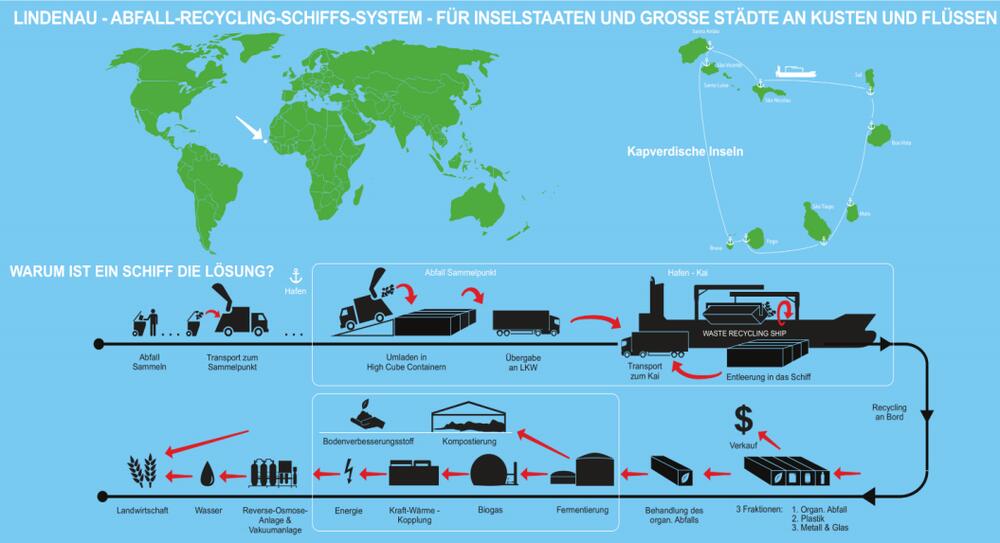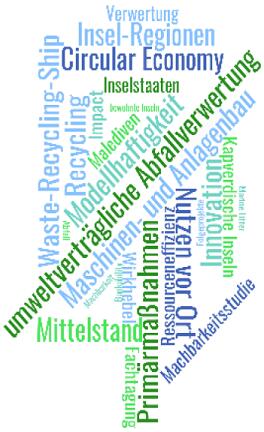Waste-Recycling-Ship: Feasibility of environmentally sound waste recycling for island regions on special ships
International project funding
Subject and goals of the project
The contamination of the world's oceans, sediments and beaches with long-lived waste products has major environmental, economic and social consequences. The process of this „marine litter“ has now reached a scale of over 100 million tons.
The project focuses on the litter situation of small island groups as well as the situation on the seas themselves. The main object of the project is a feasibility study for the sustainable supply and disposal of small island groups with special ships, on which all essential logistical and waste treatment processes are integrated. The benchmark here is the high environmental requirements applicable in Germany.
A second part of the project aims at a scientifically accompanied symposium on the subject dealing with
- primary measures (special ships) that prevent emissions into the oceans, and
- with questions of traceability and economically viable recycling of waste already emitted into the sea.
Innovation and exemplary nature of the project
Waste disposal from small islands is already carried out in some cases. However, these are pure transports, which usually do not lead to a waste treatment/waste recycling plant, but only to a (central) landfill. Waste incinerators installed on ships are also known. In contrast, the ships planned by the project consortium are to carry out further processing and recycling of waste types in addition to sorting, thereby creating jobs and value in the target regions.
The implementation relevance of the study is given in perspective by the fact that on the one hand there are numerous shipyards in Germany in the dimension of SMEs, which see their future in special shipbuilding. On the other hand, Germany has a large number of medium-sized mechanical and plant engineering companies as well as extensive scientific expertise in the field of waste treatment plants. This project is intended to contribute to bringing together the above competences and to develop integral overall concepts and new concrete approaches to solutions adapted to different local situations together with the local partners.
Special aspects of the project
The projects presented here consider and concretize the technical-logistical as well as the social-sustainability-oriented implementation of the waste management solution. A particular challenge is to try to do this in a political environment in the target regions that is characterized by volatility and disruption. Therefore, multilateral and synergistic benefits on the ground beyond the technical aspects play a similarly relevant role as the fact that ships are movable capital goods. Another special aspect in the project is that although it is a preparatory project itself, it defines the sustainable impacts in detail and also establishes the "bankability" for a larger investment (KfW, dimension € 90 million) on the business model side.
Funding subject: Efficient use of resources thanks to innovative manufacturing processes, materials and surface technologies
Cooperation partners:
- Lindenau Maritime Engineering & Projecting, Kiel
- Society for the Utilization of Organic Waste (GVoA), Hille
- Technical University of Braunschweig, Braunschweig
- Prof. Andreas Meyer-Bohe, Kiel
Associated partners:
- The governments of the nations Maldives and Cape Verde including their embassies/consulates in Germany as well as honorary consuls
- KfW-Auslandsbank as creditor (90 million €)
- The Chamber of Foreign Trade
Locations:
- Maldives
- Cape Verde
- Seychelles
- Croatian islands
- About 100 000 inhabited islands without waste management
Funding period: Between August 2012 and March 2017 a total of 66 months in 4 consecutive projects, Download final report
Project costs: Total volume of the 4 projects: 576 209 Euro, DBU funding of the 4 projects: 296 938 Euro
DBU-AZ: 32674
Note: Translation of the German version with DeepL
Last updated: 15.11.2021



